Gateway
Communications
Gateway
Communications Products @6018.adf - Gateway
Communications G/Ethernet and G/Ethertwist
Controller
NOTE: Both G/Ethernet and G/Ethertwist use the same ADF. [?]
gelandrv.zip G/Ethernet & G/EtherTwist Driver Installation v1.01
Packet Driver 1.13 sigh...
NOTE: Both G/Ethernet and G/Ethertwist use the same ADF. [?]
gelandrv.zip G/Ethernet & G/EtherTwist Driver Installation v1.01
Packet Driver 1.13 sigh...
NOTE: Thanks to our Digital Overlords, I can't determine WHAT the G/Ethertwist was for [eg. Model 50/60? ]. SWAG: Gateway Communications made a packaged system with a modified [and licensed] version of Netware, along with purposely modified LAN cards. My SWAG is the "G/Ethertwist" moniker was used with the permission of HP
Normularily, any MCA adapter can run asynchronously. BUT the G/Ethertwist is an I/O Slave and it is operated in PIO mode from the system master [CPU]. A good part of the logic is from the HCTLS family. What properties HCTLS has, I dunno. The HCTLS's response times are sufficient for the 286-10 in the Model 50, but it falls woefully short in a Model 95. The system Master's timing window for driving the G/Ethertwist is so short, compared to the Model 50?
ALFH from VCF said:
There are three different versions of packet driver GEMCTCP.COM in Discmaster and I just tested them all: https://discmaster.textfiles.com/search?q=GEMCTCP.COM&dedup=dedup
1.15B DHCP works, static IP works. I can ping other computers on my network but if I ping PS/2 from network the PS/2 hangs. Not even ctrl+alt+del work when it freezes.
1.14 No DHCP, no ping with static IP
1.13 No DHCP, no ping with static IP
I put my Model 50 on the table and installed the G/Ethertwist, using "@6018.ADF" configured it again at IRQ 5 / I/O base 280. I ran that 1.15B GEMCTCP.COM packet driver and mTCP stuff from a floppy. And it worked!
Tried connect to some BBS and IRC server and connection was steady.
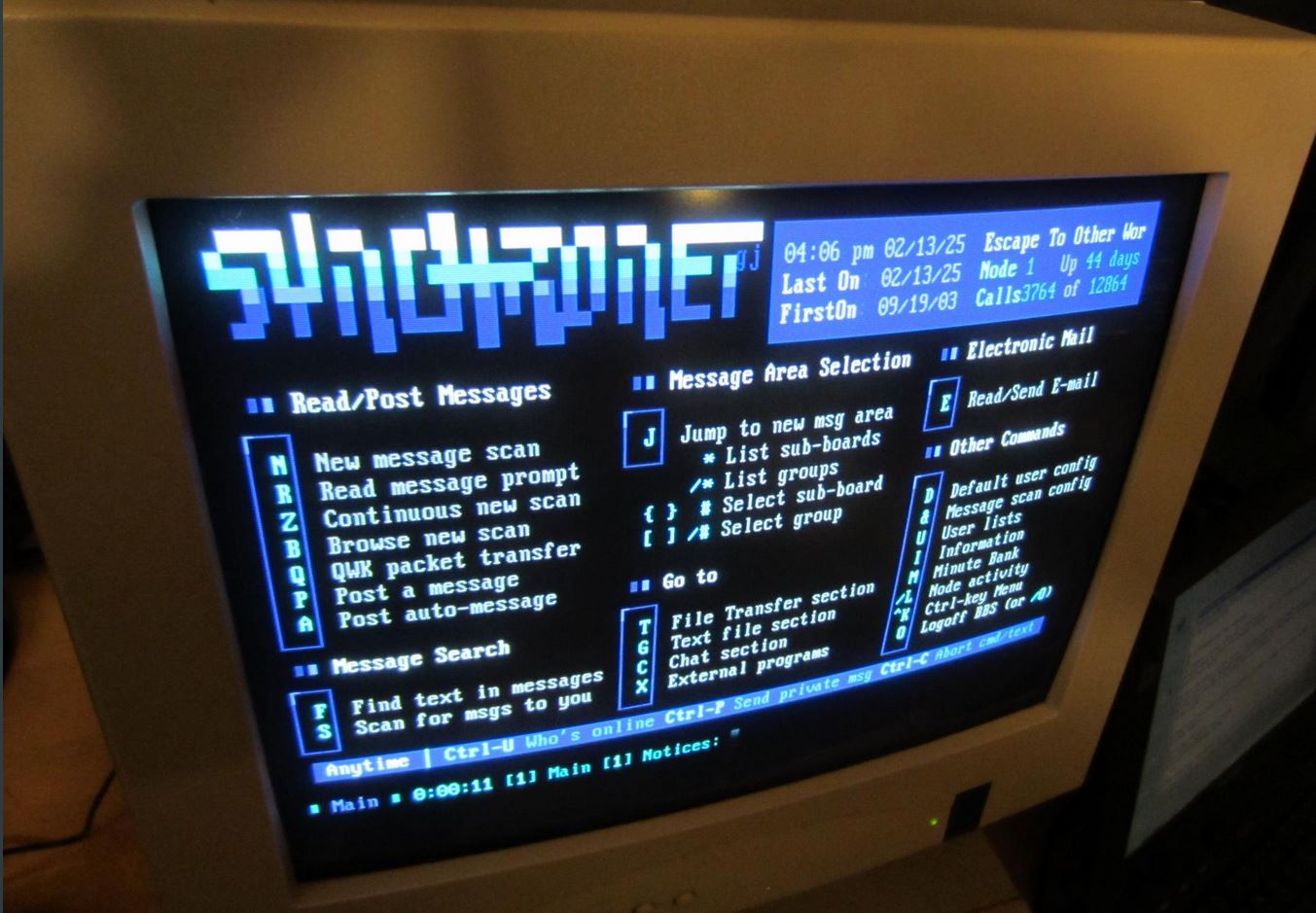
Next I tried to boot Model 95 with clean DOS 6.22 floppy and did the same thing with that, but it froze again after connecting the IRC server. It connected and received some text before it froze after second or two. Dunno if the driver is not compatible or Model 95 does not like the card..
NOTE: I can't tell if it is a timing window issue, a software issue, or a hardware issue. Or "Yes" to all above... LFO
G/Ethertwist MC 8220-0087 Front AUI / TP dtd 9032 ? Image from seller ctesales
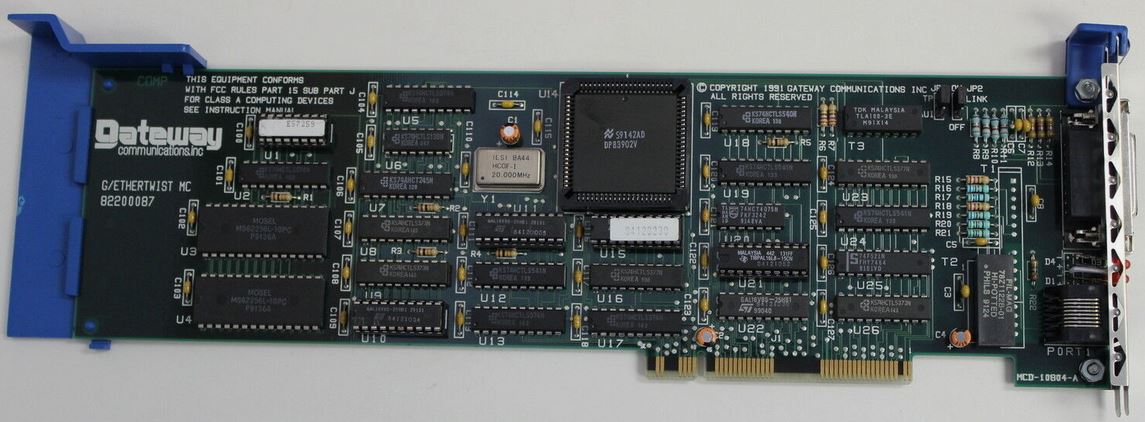
| D1, 2, 3, 4
Status LEDs JP1 TP / AUI JP2 LINK LED P1 TP P2 AUI |
U1 Network Address ? U3, 4 MS62256L-10P U14 DP83902V Y1 20.000 MHz osc 0 |
JP2 LINK Integrity Test
Enabled Pins 1 & 2 Closed
Disabled Pins 2 & 3 Closed
NOTE: Link Integrity is used with 10Base-T. Disable when using AUI transceiver.
DP83902V Datasheet
G/Ethertwist MC 8220-0087 Rear AUI / TP
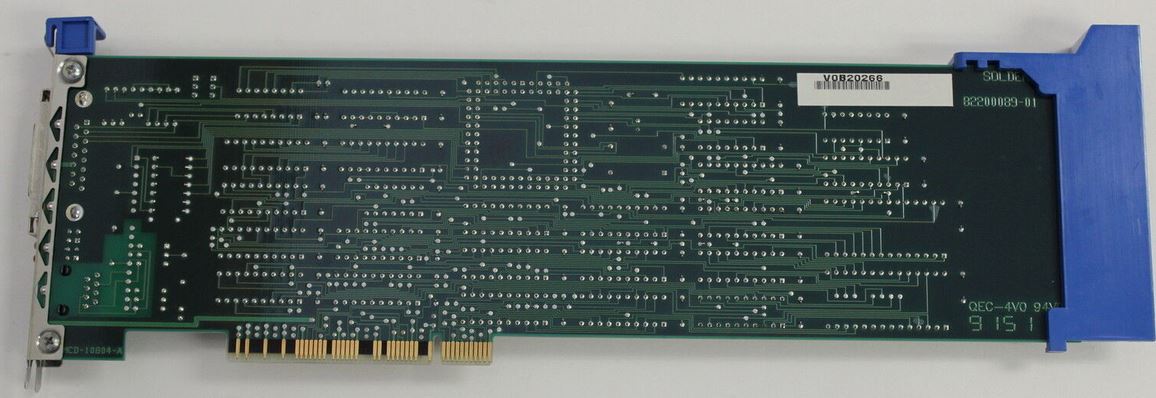
G/Ethertwist MC 8220 Ports AUI / TP

G/Ethertwist MC 8220-0088 Front AUI / TP dtd 9132 ? Image from VCF user Alfh
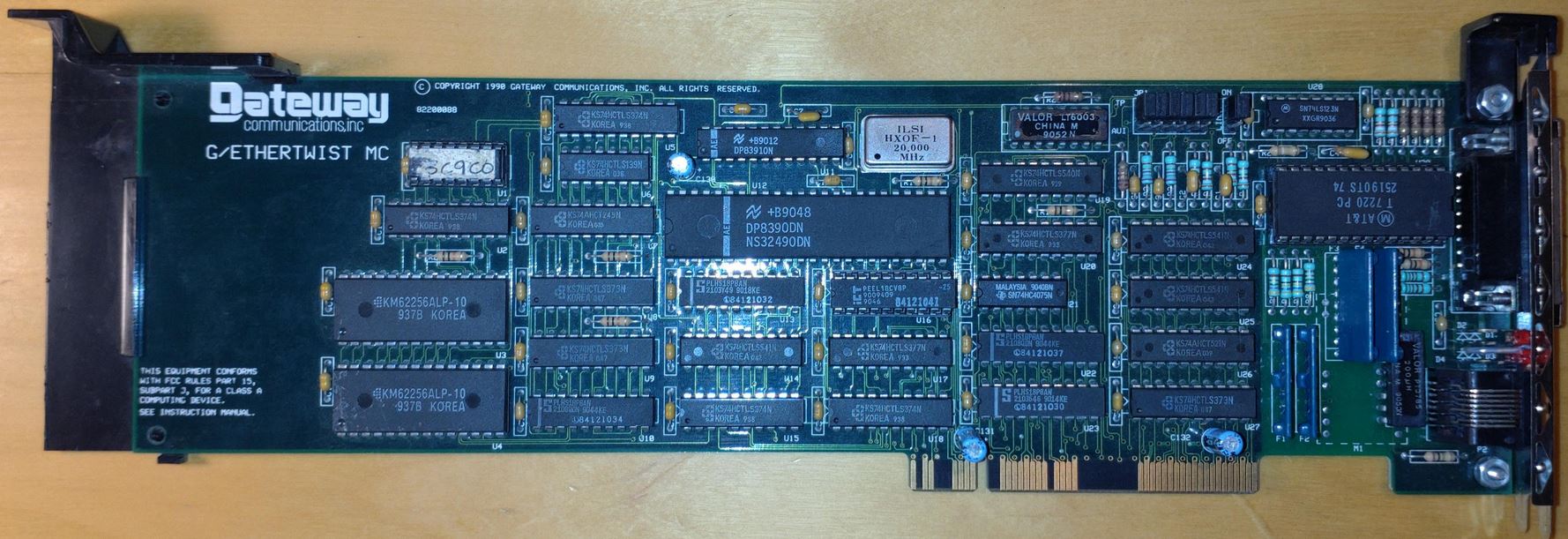
| D1,2,3,4
Status LEDs F1,2,3,4 Conformal SIPPs JP1 TP / AUI JP2 LINK P1 AUI P2 TP |
U1
Network address? U3,4 KM62256ALP-10 U11 DP83910N U12 DP8390DN U28 AT&T T7220PC Y1 20.000 MHz |
AT&T T7220PC Twisted-Pair Medium Attachment Unit (TPMAU)
G/Ethertwist MC 8220-0088 Rear AUI / TP
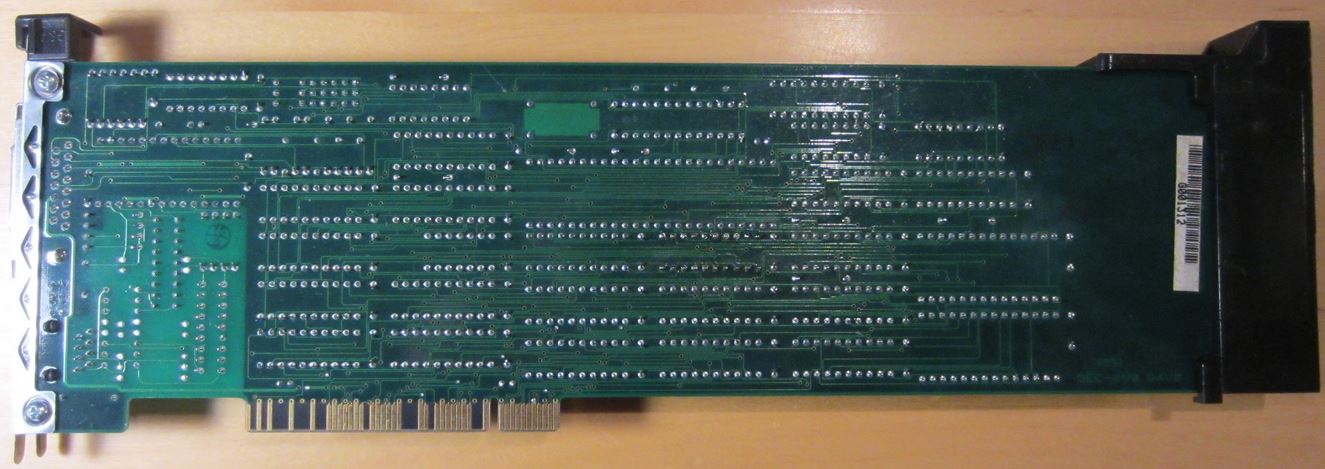
Diagnostic LEDs
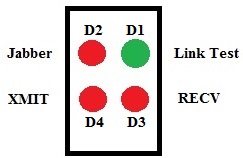
|
DIAGNOSTIC LED(S) |
|
|
Status |
Condition |
|
Jabber LED (D2) ON (Red) |
Adapter continually sends random data |
|
Link test LED (D1) ON (Green) |
Network connection good |
|
Link test LED (D1) Blinks (Green) |
Wiring error, disabled test jumper |
|
Transmit LED (D4) Blinks (Red) |
Data is being transmitted |
|
Receive LED (D3) Blinks (Red) |
Data is being received |
G/Ethertwist Card Edge Connectors thx to ALFH from VCF for parent images!
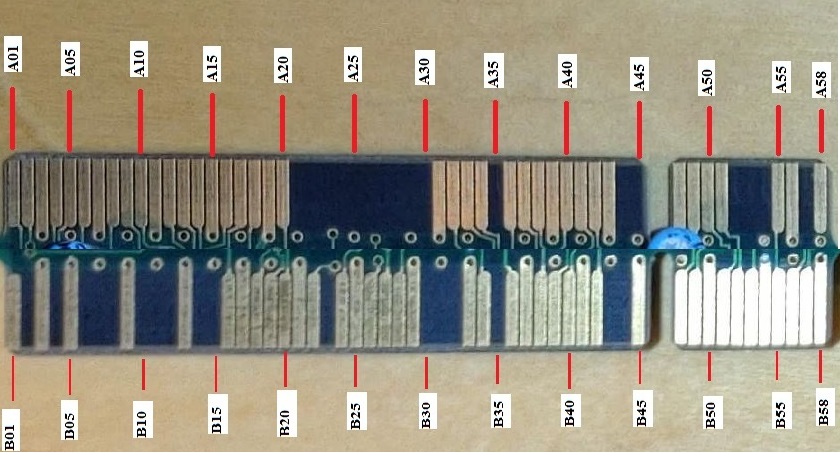
Unpopulated connectors:
A side Preempt, Burst, ARB0-4, Arb/Gnt, TC, DS 16 RTN, Refresh, DPAR, SBHE, IRQ14
B side IRQ3, DPAREN, DPAR(0), CHCK, CHRDYRTN, SD Strobe, SDR(0)
Comments [snide]
The G/Ethertwist looks to embody the purest form of being an "I/O Slave", where the system master [CPU] does a lot. Many contacts are not populated, and this prevents the adventuresome souls out there from editing the ADF [the signal is not present! ].
There is no DMA support. No Arb/-Gnt support. No Arbitration support... The adapters used in the 486-class systems usually have most if not all contacts populated. The G/Ethertwist's connectors resemble the smile of a long-time crystal meth user...
G/Ethernet MC 8221-0031 Front AUI / 10b2 dtd 9040 ? Image from seller ctesales
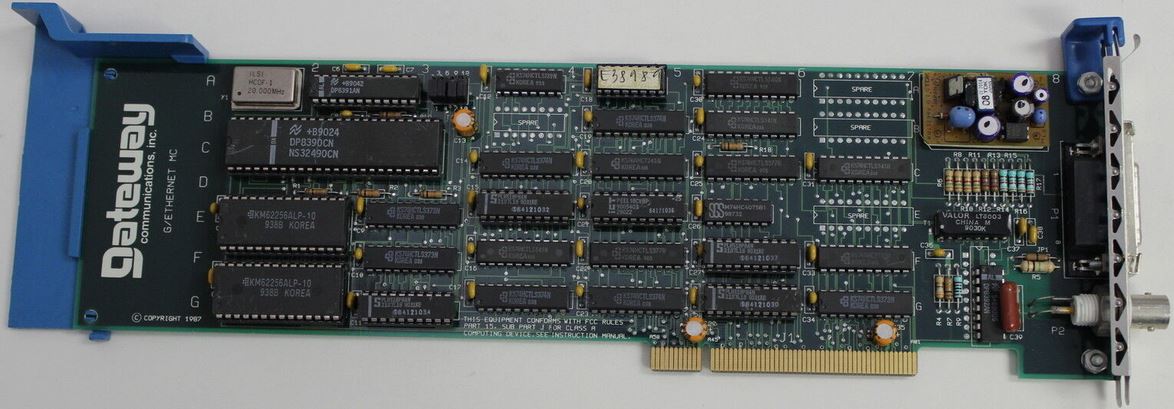
| A2
DP8391AN A3 Jumper block A5 Network Address ? C1 DP8390CN E1 KM2256ALP-10 G1 KM2256ALP-10 |
G8
DP8392AN JP1 ? P1 AUI P2 Coax Y1 20.000 MHz osc 0 |
DP8390CN
DP8391AN Serial Network Interface [SNI]
DP8392AN Coaxial Transceiver Interface [CTI]
NOTE: The G/Ethernet has ALL connectors populated. IF the circuitry exists, it MIGHT be possible to add one or two IRQs and I/O ranges to the @6018.adf.
G/Ethernet MC 8221-0031 Rear AUI / 10b2

G/Ethernet MC 8221 Slots AUI / 10b2

8221 supports 10b2 and 10b5 cabling.
ADF Sections for @6018h "Gateway Communications G/Ethernet Controller"
NumBytes 2
Interrupt Level Select
Interrupt level used by the adapter. Default is <Level 5>
<"IRQ Level 5">, 4, 6, 7, 9, 10, 11, 12
NOTE: If you open the ADF, you will see the very SIMMple scheme:
pos[0]=XXX0100Xb [Int 4] through pos[0]=XXX1100Xb [Int 12].
I/O Port Select
I/O address range used by the adapter. Thirty-two contiguous addresses are used in each choice. More ranges can be defined if these conflict.
<"I/O Base 280" [0280h-029Fh]>, 2A0 [02A0-02BF], 2C0 [02C0-02DF], 2E0 [02E0h-02FF], 300 [0300h-031F], 320 [0320h-033F], 340 [0340-035F], 360 [0360-037F], 380 [0380-039F]
NOTE: "More ranges can be defined if these conflict" means WHAT?